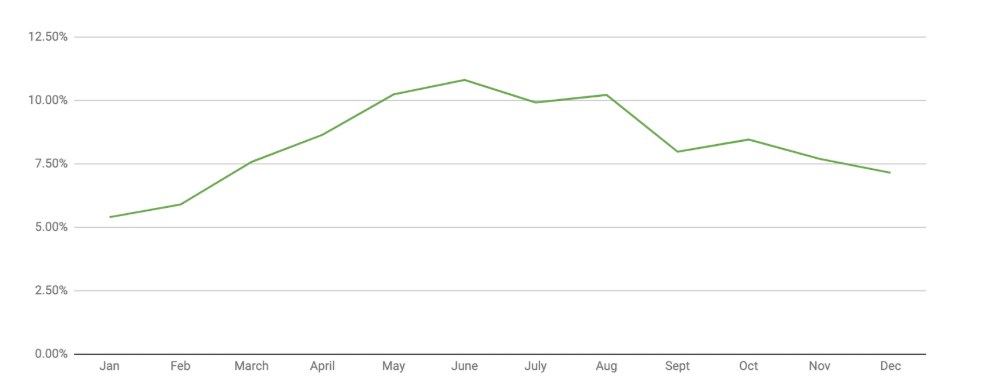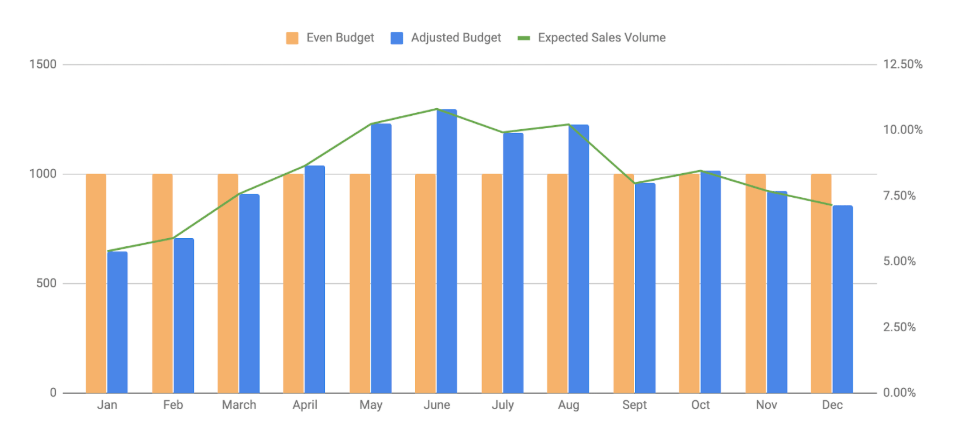
Almost every industry is affected by seasonality trends. Some parts of the year are busier than others, and this ends up playing a role in your workloads. If you’ve been involved in your business vertical long enough, you’re sure to know when the busy times are, and therefore you plan ahead for it. Resources are scheduled and planned accordingly to be ready for the wave. For accountants, it’s tax season. For retail, it’s the holidays. For the housing market, it’s the spring and fall .
Whatever time of year you classify as your busy season, this is the time to capitalize and make your buck for the year. To maximize your potential during this year’s peak, you’ll want to make sure your plan includes how you spend your marketing dollars and how to incorporate a ‘prep’ and awareness period to build momentum. Just like you adjust your on-hand resources to handle the influx of customers, inquiries, and transactions, you’ll want to flex how you spend your money with your advertising so you get the most out of every dollar spent.
The best way to explain this is to look at an example.
In the real estate industry, it’s pretty well known that the market gets hot during the early spring, then peaks in mid-summer and slowly tapers off towards the end of the year. Realtors would want to consider advertising in FEB/MAR in anticipation of the marketing picking up in April. The National Association of Realtors releases numbers each month on the number of homes sold. If you compile the data, it looks something like this.
|
Jan |
Feb |
March |
April |
May |
June |
July |
Aug |
Sept |
Oct |
Nov |
Dec |
|
5.40% |
5.90% |
7.58% |
8.65% |
10.24% |
10.81% |
9.92% |
10.22% |
7.98% |
8.46% |
7.70% |
7.15% |

https://www.nar.realtor/research-and-statistics/housing-statistics/existing-home-sales
You can do this for your business too! If you’ve been in business for a few years, consider looking at your sales data over the last 3 – 5 years. You can calculate what to expect each month by dividing each month’s sales numbers by the yearly total to get your monthly percentage. Once you have your estimated sales volume by month, you can take these numbers and properly plan out your marketing budget.
Traditional thinking would have you split your marketing budget evenly for the year. Let’s say you have $12,000 to spend on marketing for the year. $12,000 divided by 12 months means you have $1,000 to spend each month (8.3% of your budget each month).
|
Jan |
Feb |
March |
April |
May |
June |
July |
Aug |
Sept |
Oct |
Nov |
Dec |
|
$1,000 |
$1,000 |
$1,000 |
$1,000 |
$1,000 |
$1,000 |
$1,000 |
$1,000 |
$1,000 |
$1,000 |
$1,000 |
$1,000 |
Since not as many people are buying and selling houses in January, you might consider moving some budget and use your savings to build momentum in advance of the busier months when the demand starts to increase. For the real estate market example, your budget will look something like this:
|
Jan |
Feb |
March |
April |
May |
June |
July |
Aug |
Sept |
Oct |
Nov |
Dec |
|
$648.46 |
$707.62 |
$910.13 |
$1037.54 |
$1228.67 |
$1296.93 |
$1189.99 |
$1226.39 |
$957.91 |
$1014.79 |
$923.78 |
$857.79 |

So you could think about spending less of your budget in January and transition that money in anticipation of increasing sales to May, April, May when demand is likely to ramp up. This is spending your budget more efficiently since it’s more likely to push your advertising onto people during periods of time they are more likely to consider your product or service.
What you will find is that your advertising will become more effective. You’ll get higher engagement and an increased ROI for what you put into your ads because you’ll be better allocating your marketing dollars.
If you’re really good at tracking your lead and revenue sources, you can even take things a step further and apply this same mathematical logic to decide what channels to advertise on. For example, if 35% of your leads come from Facebook advertising, it would probably make sense to invest 35% of your marketing budget each month into Facebook.
We know that there are a lot of factors to consider when developing an overall advertising strategy. Budget can play a big role in the effectiveness of your advertising. If you’re looking for help on building out a game plan, let us know. We are here for you.



